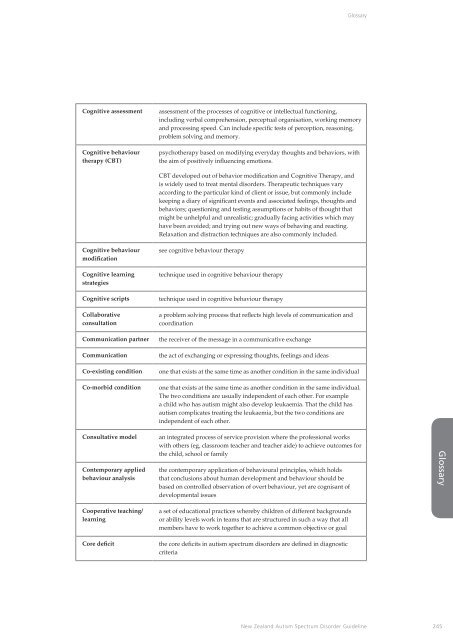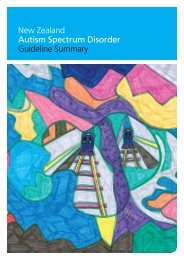New Zealand Autism Spectrum Disorder Guideline - Ministry of Health
New Zealand Autism Spectrum Disorder Guideline - Ministry of Health
New Zealand Autism Spectrum Disorder Guideline - Ministry of Health
You also want an ePaper? Increase the reach of your titles
YUMPU automatically turns print PDFs into web optimized ePapers that Google loves.
Glossary<br />
Cognitive assessment<br />
Cognitive behaviour<br />
therapy (CBT)<br />
assessment <strong>of</strong> the processes <strong>of</strong> cognitive or intellectual functioning,<br />
including verbal comprehension, perceptual organisation, working memory<br />
and processing speed. Can include specific tests <strong>of</strong> perception, reasoning,<br />
problem solving and memory.<br />
psychotherapy based on modifying everyday thoughts and behaviors, with<br />
the aim <strong>of</strong> positively influencing emotions.<br />
CBT developed out <strong>of</strong> behavior modification and Cognitive Therapy, and<br />
is widely used to treat mental disorders. Therapeutic techniques vary<br />
according to the particular kind <strong>of</strong> client or issue, but commonly include<br />
keeping a diary <strong>of</strong> significant events and associated feelings, thoughts and<br />
behaviors; questioning and testing assumptions or habits <strong>of</strong> thought that<br />
might be unhelpful and unrealistic; gradually facing activities which may<br />
have been avoided; and trying out new ways <strong>of</strong> behaving and reacting.<br />
Relaxation and distraction techniques are also commonly included.<br />
Cognitive behaviour<br />
modification<br />
Cognitive learning<br />
strategies<br />
Cognitive scripts<br />
Collaborative<br />
consultation<br />
Communication partner<br />
Communication<br />
Co-existing condition<br />
Co-morbid condition<br />
see cognitive behaviour therapy<br />
technique used in cognitive behaviour therapy<br />
technique used in cognitive behaviour therapy<br />
a problem solving process that reflects high levels <strong>of</strong> communication and<br />
coordination<br />
the receiver <strong>of</strong> the message in a communicative exchange<br />
the act <strong>of</strong> exchanging or expressing thoughts, feelings and ideas<br />
one that exists at the same time as another condition in the same individual<br />
one that exists at the same time as another condition in the same individual.<br />
The two conditions are usually independent <strong>of</strong> each other. For example<br />
a child who has autism might also develop leukaemia. That the child has<br />
autism complicates treating the leukaemia, but the two conditions are<br />
independent <strong>of</strong> each other.<br />
Consultative model<br />
Contemporary applied<br />
behaviour analysis<br />
an integrated process <strong>of</strong> service provision where the pr<strong>of</strong>essional works<br />
with others (eg, classroom teacher and teacher aide) to achieve outcomes for<br />
the child, school or family<br />
the contemporary application <strong>of</strong> behavioural principles, which holds<br />
that conclusions about human development and behaviour should be<br />
based on controlled observation <strong>of</strong> overt behaviour, yet are cognisant <strong>of</strong><br />
developmental issues<br />
Glossary<br />
Cooperative teaching/<br />
learning<br />
Core deficit<br />
a set <strong>of</strong> educational practices whereby children <strong>of</strong> different backgrounds<br />
or ability levels work in teams that are structured in such a way that all<br />
members have to work together to achieve a common objective or goal<br />
the core deficits in autism spectrum disorders are defined in diagnostic<br />
criteria<br />
<strong>New</strong> <strong>Zealand</strong> <strong>Autism</strong> <strong>Spectrum</strong> <strong>Disorder</strong> <strong>Guideline</strong> 245











